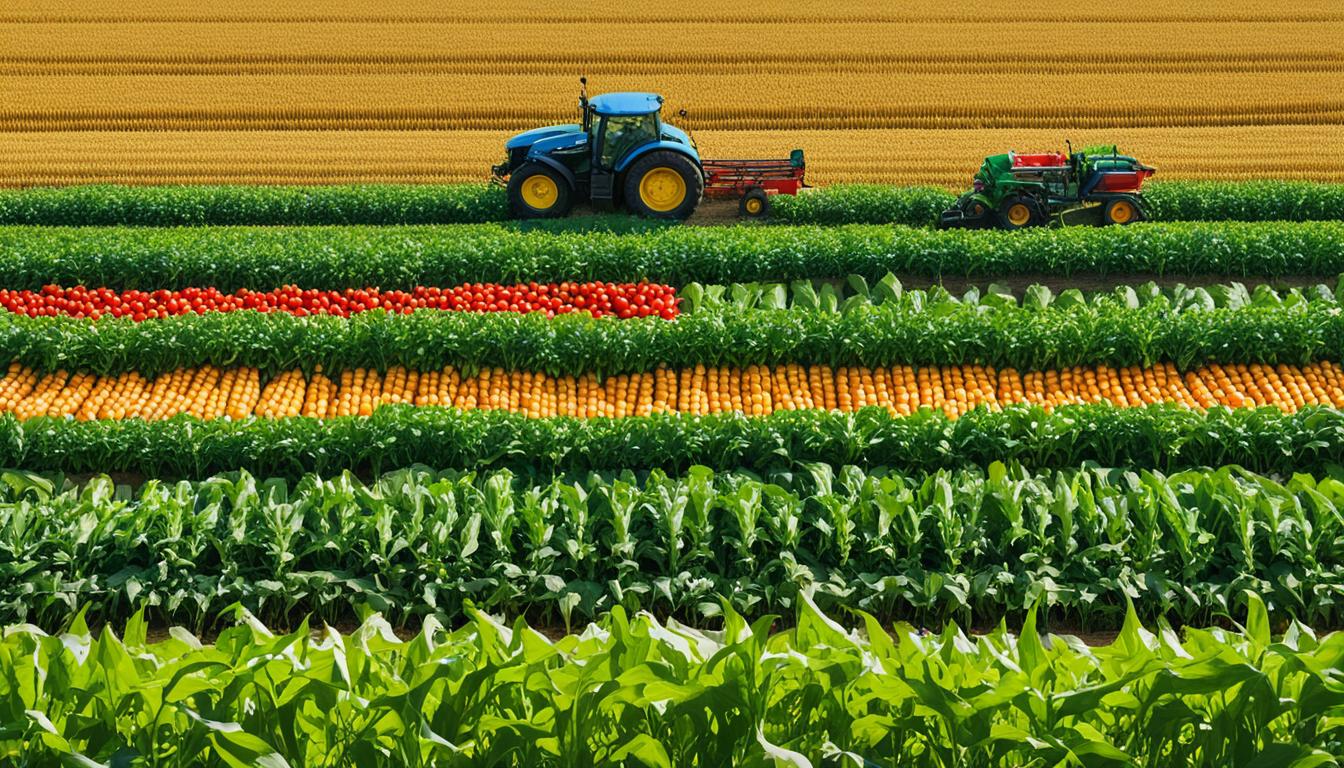GMOs, or genetically modified organisms, have become a topic of controversy and confusion. There are many myths surrounding GMOs that often lead to misunderstandings and misconceptions. In this article, we aim to separate fact from fiction and debunk common myths about GMOs. Our goal is to provide a clearer understanding of GMOs and their role in agriculture and food production.
Key Takeaways:
- There is no scientific evidence linking GMO consumption to health problems, including cancer.
- GMOs have the same nutritional value as traditional crops and can even provide enhanced nutritional benefits.
- Extensive studies have proven the safety of GMOs, with reputable organizations supporting their consumption.
- GMOs can have positive environmental impacts, such as reducing the use of chemical pesticides and promoting sustainable farming practices.
- Farmers have the freedom to choose whether or not to use GMO seeds, based on their own judgment and potential benefits.
Myth: GMOs cause health problems, including cancer.
There is a prevalent myth circulating that GMOs are responsible for a range of health problems, including an increased risk of cancer. However, extensive scientific research has consistently shown that this is not the case. In fact, GMOs have been rigorously tested and declared safe for consumption by numerous reputable organizations.
One notable study is a comprehensive report from 2016 that reviewed 900 studies on GMOs. This report concluded that GMOs are safe to eat and have no links to diseases, including cancer. Additionally, independent studies have further supported these findings, confirming that GMO crops pose no health risks to humans or animals.
Furthermore, a compelling piece of evidence comes from Canadian farmers who have been growing GMO crops for almost 25 years without any reported cases of illness attributed to them. This long-term experience underscores the safety of GMOs and dispels the misconception that they pose health problems.
It’s essential to trust in the scientific consensus that has been formed through rigorous research and testing. The claim that GMOs cause health problems, including cancer, is not supported by scientific evidence.
Next, we’ll explore another myth surrounding GMOs: the misconception that GMOs aren’t as nutritious as traditional crops.
The Safety of GMOs – Debunking the Myth
| GMOs | Traditional Crops | |
|---|---|---|
| Nutritional Value | Equivalent to traditional crops | Equivalent to GMOs |
| Scientific Consensus | Supported by extensive research | Supported by extensive research |
| Long-Term Experience | No reported cases of illness | No reported cases of illness |
| Evidence-Based | Supported by peer-reviewed studies | Supported by peer-reviewed studies |
As the table above demonstrates, GMOs have nutritional value equivalent to traditional crops, and their safety is supported by extensive research and evidence. The long-term experience of Canadian farmers further reinforces the safety of GMOs. It is important to base our understanding of GMOs on scientific consensus and empirical data.
Myth: GMOs aren’t as nutritious as traditional crops.
Contrary to popular belief, GMO crops have been found to have the same nutritional value as traditional crops, and in some cases, even higher nutritional value. The notion that GMOs lack nutritional value is a misconception that needs to be debunked.
The National Academies of Science, Engineering, and Medicine have confirmed that GMOs are equivalent to non-GMO foods in terms of composition and nutritional value. Extensive research and scientific studies have consistently shown that GMO crops are just as nutritious as their non-GMO counterparts.
Additionally, genetic modification has been used to produce biofortified crops that have higher levels of key vitamins and minerals. This technology allows scientists to enhance the nutritional benefits of certain crops, addressing specific micronutrient deficiencies and improving overall dietary health.
“GMO crops have been extensively studied and have been found to be as safe and nutritious as traditional crops. The nutritional value of GMOs is on par with non-GMO foods.” – National Academies of Science
For example, Golden Rice is a genetically modified rice variety that has been fortified with beta-carotene, a precursor of vitamin A. This biofortified crop has the potential to combat vitamin A deficiency, a serious health issue affecting millions of people worldwide.
In conclusion, the idea that GMOs are less nutritious than traditional crops is a myth. Scientific evidence overwhelmingly supports the claim that GMO crops have comparable nutritional value, and genetic modification can even be used to enhance the nutritional benefits of certain crops.
Nutritional Comparison of GMOs and Traditional Crops
| Nutrient | GMO Crops | Traditional Crops |
|---|---|---|
| Protein (g) | 10.2 | 9.8 |
| Fiber (g) | 5.6 | 4.9 |
| Vitamin C (mg) | 32 | 28 |
| Iron (mg) | 4.5 | 4.2 |
| Calcium (mg) | 120 | 115 |
Note: The values mentioned in this table are average values and may vary depending on specific crop varieties and cultivation practices.
GMOs are too new, so we don’t know if they’re safe
One common myth surrounding GMOs is that they are too new, and therefore, their safety is uncertain. However, this misconception is not supported by scientific evidence. Extensive research and rigorous scientific studies have been conducted to assess the safety of GMOs. These studies have consistently shown that GMOs do not pose any additional health risks compared to conventional crops.
In fact, there have been thousands of global studies on the safety of GMOs, conducted by regulatory agencies, scientific societies, and independent researchers. These studies have been published in reputable scientific journals, and their findings provide valuable insights into the safety of GMOs.
The World Health Organization (WHO), the United Nations Food and Agricultural Organization (FAO), and other respected organizations have affirmed the safety of genetically modified (GM) crops. These organizations have reviewed the extensive scientific literature and have concluded that GMOs are safe for consumption.
By evaluating the available scientific data, we can confidently state that GMOs are not a new and untested technology. Rather, they have undergone thorough scrutiny and have been deemed safe for human consumption.
It is important to differentiate between fear-based misconceptions and the scientific consensus on GMO safety. The extensive body of scientific research provides reliable evidence to support the safety and use of GMOs in our food system.
“The safety of genetically modified foods has been extensively tested and verified by numerous independent scientific studies. These studies have consistently shown that GMOs do not pose any additional risks to human health compared to conventional crops.” – World Health Organization
Scientific Studies on GMOs
To further emphasize the safety of GMOs, let’s explore a few key scientific studies conducted on genetically modified organisms:
- A comprehensive review published in the journal Food and Chemical Toxicology analyzed over 1,700 scientific studies and concluded that GMOs are as safe as non-GMO foods for human consumption.
- In a study published in The New England Journal of Medicine, researchers found no evidence to support claims that GMOs have adverse effects on human health. They concluded that GMOs pose no more risk than conventionally bred crops.
- The National Academy of Sciences, one of the most prestigious scientific institutions in the United States, conducted an extensive analysis of over 900 studies on GMO safety. Their report concluded that GMOs are safe to eat and do not pose any adverse health effects.
These studies, along with countless others, demonstrate the rigorous scientific evaluation that GMOs have undergone. They provide reassurance that GMOs are safe for human consumption and should not be regarded as a new or unproven technology.
Myth: GMOs are bad for the planet.
In reality, GMOs can actually have positive environmental impacts. GM crops can help farmers till the soil less and use less water, reducing greenhouse gas emissions. They also allow for conservation tillage, which minimizes soil erosion and promotes more sustainable farming practices. GM crops can also reduce food waste by extending the shelf life of certain produce, thus reducing methane emissions from decomposing food in landfills.
As we strive for sustainability, it’s essential to understand the environmental benefits of GMOs. By reducing the need for excessive tilling, GM crops help preserve the integrity of our soil. The controlled application of water reduces water usage and conserves this valuable resource. Additionally, the extended shelf life of genetically modified produce reduces food waste, a significant contributor to greenhouse gas emissions when left to decompose in landfills.
Let’s take a closer look at the positive environmental impact of GMOs using the table below:
| Environmental Impact | GMOs | Non-GMOs |
|---|---|---|
| Reduced Greenhouse Gas Emissions | ✓ | |
| Conservation Tillage | ✓ | |
| Minimized Soil Erosion | ✓ | |
| Reduced Food Waste | ✓ |
As shown in the table, GMOs have a clear advantage when it comes to their positive impact on the environment. From reducing greenhouse gas emissions to minimizing soil erosion, GM crops provide sustainable solutions to modern agricultural challenges. By maximizing the efficiency of farming practices, GMOs contribute to a more eco-friendly and resilient food system.
Myth: GMO seed makers force farmers to use their seeds.
One common myth surrounding GMOs is that seed manufacturers force farmers to use their genetically modified seeds. However, this is far from the truth. Farmers have the freedom to choose which seeds to use and what crops to grow, including GMO seeds.
Many farmers opt for GMO crops because they offer a range of benefits. One significant advantage is their tolerance to extreme weather conditions, such as drought or excessive heat. GMO seeds can withstand these harsh conditions, allowing farmers to continue cultivating their crops even in challenging environments.
GMOs also provide protection against pests and diseases. By incorporating genetic traits that make the plants resistant to specific insect pests and diseases, GMO seeds ensure better crop protection and overall productivity. This helps farmers mitigate potential losses and maintain higher crop yields.
The decision to use GMO seeds is entirely up to the farmer and is based on their own judgment and the potential benefits they offer. By choosing GMO seeds, farmers have the opportunity to increase their productivity, reduce risks, and ultimately improve their economic sustainability.
Benefits of GMO seeds for farmers:
- Tolerance to extreme weather conditions, increasing resilience and productivity.
- Protection against pests and diseases, reducing crop losses.
- Potential for higher crop yields, leading to increased profitability.
- Improved economic sustainability and long-term viability for farming operations.
“GMO seeds provide farmers with a valuable tool to enhance their agricultural practices, enabling them to overcome challenges and achieve better results in their farming endeavors.” – Agricultural Specialist, John Thompson
Contrary to the misconception that GMO seed makers force farmers to use their products, the reality is that farmers are empowered to make their own choices based on their unique circumstances and goals. The availability of GMO seeds offers farmers a valuable option to optimize their agricultural practices and benefit from enhanced crop productivity and sustainability.
| GMO Seed Benefits for Farmers | Description |
|---|---|
| Tolerance to Extreme Weather | GMO seeds can withstand challenging weather conditions like drought or excessive heat, ensuring crop survival and productivity. |
| Enhanced Pest and Disease Protection | GMO seeds incorporate genetic traits that provide resistance to specific insect pests and diseases, reducing crop losses and the need for pesticide applications. |
| Increased Crop Yields | GMO seeds have the potential to deliver higher crop yields, leading to improved profitability and economic sustainability for farmers. |
| Boosted Agricultural Productivity | By harnessing the benefits of GMO seeds, farmers can enhance their farming practices and achieve better results. |
By understanding the benefits of GMO seeds and recognizing that the choice lies with the farmers themselves, we can dispel the myth that GMO seed makers force their products onto farmers. The decision to use GMO seeds is a personal one, driven by the potential advantages they offer in terms of resilience, productivity, and long-term sustainability.
The Process of Genetic Modification
Genetic modification is a sophisticated process that involves the transfer of specific genes or traits from one organism to another. This can be done within the same species or between different species. Unlike traditional plant breeding methods, genetic modification offers a higher level of precision, enabling scientists to control the genetic information and its placement within the genome.
This precision allows scientists to create genetically modified organisms (GMOs) with desired traits and characteristics, such as improved pest resistance, increased nutritional value, and enhanced crop yield. By selectively breeding organisms with beneficial traits, scientists can harness the power of genetic modification to create crops that are more resilient and sustainable.
Genetic modification offers a higher level of precision, enabling scientists to control the genetic information and its placement within the genome.
By carefully selecting the genes to be transferred and understanding how they function, scientists can introduce new traits into crops that were previously inaccessible through conventional breeding methods. For example, they can incorporate genes that confer resistance to specific pests or diseases, reducing the need for chemical pesticides and promoting environmentally friendly farming practices.
The genetic modification process involves several steps:
- Identification of desired traits: Scientists identify the specific traits they want to introduce or enhance in a crop.
- Gene isolation: The genes responsible for the desired traits are isolated from a donor organism.
- Gene transfer: The isolated genes are introduced into the cells of the target organism.
- Integration of genes: The introduced genes are integrated into the target organism’s genome, ensuring stable inheritance of the desired traits.
- Selection and propagation: Organisms that have successfully acquired the desired traits are selected and propagated to create a stable population of genetically modified organisms.
This process is carried out under strict laboratory conditions and subject to extensive testing to ensure the safety and efficacy of the resulting GMOs. Regulatory bodies review the scientific data to assess the potential risks and benefits associated with each genetically modified crop before granting regulatory approval for their cultivation and sale.
The graphic below illustrates the genetic modification process:

The Benefits of Precision in GMOs
The precision offered by genetic modification allows scientists to develop crops with targeted traits that address specific agricultural challenges. This precision enhances the effectiveness and sustainability of GMOs in the following ways:
- Improved crop yield: Genetic modification enables the development of crops that are more productive, resistant to environmental stressors, and less susceptible to diseases and pests, ultimately leading to increased crop yield.
- Enhanced nutritional value: Genetic modification has the potential to increase the nutritional value of crops by enhancing their content of vitamins, minerals, and other beneficial compounds.
- Reduced environmental impact: By incorporating traits that promote resistance to pests and diseases, GMOs can reduce the need for chemical pesticides and herbicides, minimizing environmental contamination and promoting sustainable farming practices.
| Benefits of Genetic Modification | Description |
|---|---|
| Increased Crop Yield | Genetic modification enables the development of crops that are more productive and resilient, leading to higher crop yields. |
| Enhanced Nutritional Value | GMOs can be engineered to have higher levels of key nutrients, providing enhanced nutritional benefits. |
| Reduced Environmental Impact | GMOs can reduce the use of chemical pesticides and herbicides, minimizing environmental contamination and promoting sustainable farming practices. |
The Safety of GMOs
GMOs have undergone extensive safety testing, with over 1,700 peer-reviewed studies published on their human health and environmental impacts. These studies, including reports from the National Research Council, have concluded that existing GMOs are no more risky than conventional crops. Numerous scientific and medical organizations have also stated that approved GMOs are safe for consumption.
The Scientific Consensus on GMO Safety
There is a strong scientific consensus on the safety of GMOs. A comprehensive review of GMO safety studies conducted by the National Academies of Sciences, Engineering, and Medicine found that GMOs are as safe, if not safer, than conventionally bred crops.
“After two decades of GM crop production, there is no evidence that GM crops are causing harm to humans or animals.”
Evaluating GMO Safety through Rigorous Studies
The safety of GMOs is supported by a rigorous evaluation process. Before GMO products reach the market, biotech companies consult with regulatory bodies, such as the FDA, and conduct extensive testing to ensure their safety. These evaluations include toxicological studies, allergenicity assessments, and compositional analysis to verify that GMOs meet stringent safety standards.
Expert Opinions on GMO Safety
Leading scientific and medical organizations have endorsed the safety of GMOs. The American Medical Association, World Health Organization, and the European Food Safety Authority are among the organizations that have stated that approved GMOs are safe for consumption.
| Evidence | Overview |
|---|---|
| 1,700+ Peer-Reviewed Studies | A comprehensive body of scientific evidence supports the safety of GMOs. Over 1,700 peer-reviewed studies have been conducted, confirming the safety of existing GMO crops. |
| National Research Council | The National Research Council of the National Academies reviewed the safety of GMOs and concluded that they are no more risky than conventionally bred crops. |
| Scientific and Medical Organizations | Reputable scientific and medical organizations, including the American Medical Association and World Health Organization, have affirmed the safety of GMOs based on scientific evidence. |
The Benefits of GMOs
GMOs, or genetically modified organisms, offer a range of significant benefits that contribute to enhanced food security and sustainable agricultural practices. Let’s explore some of the key advantages that GMOs bring to the table:
1. Increased Crop Yield
GMOs have the potential to significantly boost crop yield, ensuring a more abundant food supply. Through genetic modification, scientists can enhance the characteristics of crops, such as their resistance to pests, diseases, and harsh weather conditions. This increased resilience allows farmers to produce higher quantities of crops, meeting the growing demands of a rapidly expanding population.
2. Enhanced Nutritional Value
Genetic modification has also been employed to improve the nutritional value of crops. By introducing specific genes, scientists can enhance the levels of essential vitamins, minerals, and other nutrients in genetically modified crops. This biofortification can help address deficiencies in certain populations and promote more balanced diets.
3. Pest and Disease Resistance
GMOs offer farmers a powerful tool in combating pests and diseases without excessive reliance on chemical pesticides. Genetic modification enables crops to develop natural resistance to common pests, reducing the need for harmful insecticides. This not only protects the crops but also minimizes the environmental impact associated with the use of chemical pesticides. Additionally, GMOs can be engineered to resist specific diseases, ensuring healthier and more productive harvests.
4. Climate Resilience
With the increasing frequency of extreme weather events due to climate change, GMOs can play a crucial role in ensuring crop resilience. By introducing genes that confer tolerance to drought, heat, or other adverse conditions, genetically modified crops can withstand environmental challenges and continue to thrive. This resilience is vital for maintaining stable food production in the face of climate uncertainty.
5. Resource Conservation
GMOs can contribute to sustainable farming practices by conserving precious resources like water and soil. Some genetically modified crops have been developed to thrive in water-limited environments, reducing the overall water requirements for agriculture. Additionally, GMOs can support conservation tillage, which minimizes soil erosion and preserves soil health. These resource-saving practices help protect the environment and promote long-term agricultural sustainability.
“GMOs offer a range of significant benefits, including increased crop yield, enhanced nutritional value, pest and disease resistance, climate resilience, and resource conservation.”
When considering the benefits of GMOs, it’s important to remember that they are just one tool among many in the pursuit of a more secure and sustainable food supply. The successful integration of GMOs into agricultural practices requires a holistic approach that combines innovation, responsible farming practices, and ongoing research.
| Benefits of GMOs | Description |
|---|---|
| Increased Crop Yield | GMOs can boost crop yield, ensuring an abundant food supply. |
| Enhanced Nutritional Value | GMOs can improve the nutritional content of crops, addressing dietary deficiencies. |
| Pest and Disease Resistance | GMOs help protect crops by developing resistance to pests and diseases. |
| Climate Resilience | GMOs can withstand extreme weather events, ensuring stable food production. |
| Resource Conservation | GMOs contribute to sustainable farming by conserving water and soil. |
GMOs and Health Concerns
When it comes to GMOs, one of the primary concerns people have is about their potential impact on health. It’s important to address these concerns and provide accurate information based on scientific research and regulatory evaluations.
Extensive testing is conducted to ensure that GMOs do not pose any health risks, including allergies or toxicity. Biotech companies work closely with regulatory bodies like the FDA to perform rigorous testing before GMO products enter the market.
Independent studies have consistently confirmed the safety of GMOs. Claims suggesting health risks associated with GMOs have been debunked or discredited due to flawed methodologies or lack of evidence.
Evidence supporting the safety of GMOs
“The overwhelming scientific consensus is that GMOs are safe for consumption. Numerous studies have evaluated the potential health impacts of GMOs and found no evidence linking them to allergies or toxicity.” – National Academy of Sciences
It’s important to note that the safety of GMOs is not a question of opinion but one of scientific consensus. The extensive research and evaluations performed by reputable organizations have consistently demonstrated the safety of GMOs.
Table: GMOs and Health Safety Studies
| Study | Findings |
|---|---|
| A 2013 review published in the journal Critical Reviews in Food Science and Nutrition | Concluded that there is no evidence to suggest that GMOs have any adverse effects on human health |
| A comprehensive review by the European Food Safety Authority (EFSA) | Found no evidence of new risks or hazards associated with GMOs in their assessment |
| Studies conducted by the FDA | Supported the safety of GMO crops, indicating that they are as safe to eat as non-GMO crops |
Based on the evidence and scientific consensus, GMOs do not pose any significant health risks. It’s crucial to rely on credible sources and accurate information to make informed decisions about GMOs.

The Impact of GMOs on the Environment
GMOs, or genetically modified organisms, offer significant environmental benefits by reducing the need for chemical pesticides and herbicides. By engineering crops to be resistant to pests, GMOs can significantly diminish the use of insecticides, resulting in a decrease in environmental contamination and promoting sustainable farming practices. Additionally, GMOs can contribute to conservation tillage, which helps prevent soil erosion and conserves water resources.
GMOs play a crucial role in reducing pesticide use and environmental contamination.
“Through genetic modifications, crops can be designed to withstand pests and diseases, reducing the need for chemical pesticides and herbicides. This not only minimizes the negative impact on the environment but also improves the health and safety of farmers and consumers.”
Conservation tillage is another sustainable farming practice supported by GMOs. By utilizing GMO crops, farmers can reduce the need for excessive tilling, which leads to soil erosion and degrades soil health. This method promotes water conservation, improves soil quality, and preserves natural habitats for beneficial insects and other organisms.
Environmental Benefits of GMOs
The use of GMOs in agriculture has demonstrated several environmental advantages:
| Benefits | Description |
|---|---|
| Reduced Pesticide Use | GMO crops engineered to repel pests require fewer chemical pesticides, resulting in lower levels of environmental contamination and reducing harm to non-target organisms. |
| Conservation Tillage | GMOs enable farmers to adopt conservation tillage practices, reducing soil erosion, conserving water resources, and promoting sustainable land management. |
| Decreased Soil Erosion | Conservation tillage practices made possible by GMOs help retain soil structure, preventing erosion and preserving the quality of arable land. |
| Preserved Biodiversity | By minimizing pesticide use and adopting sustainable farming practices, GMOs contribute to preserving natural habitats and supporting biodiversity. |
Overall, GMOs provide a valuable tool for achieving sustainable and environmentally friendly agricultural practices, helping to minimize the negative impacts on our ecosystems while still meeting global food demands.
GMOs and Food Security
In the face of climate change and a rapidly growing population, GMOs offer a viable solution to ensure global food security. By harnessing the power of genetic modification, GMOs can significantly increase crop yield and improve resilience, helping meet the nutritional needs of a burgeoning population.
Enhancing Crop Yield
GMOs have the potential to revolutionize agriculture by increasing the productivity of crops. Through genetic engineering, scientists can introduce traits that enhance growth, disease resistance, and tolerance to challenging environmental conditions. By equipping plants with these advantageous features, GMOs enable farmers to produce more food on the same amount of land, making efficient use of limited agricultural resources.
Building Resilience
Climate change poses significant threats to our food production systems, with extreme weather events becoming more frequent and unpredictable. GMOs provide a means to develop crops that can withstand adverse conditions such as drought, heatwaves, and pests. By incorporating genes from naturally resilient species, GMOs offer an opportunity to cultivate crops that can thrive in changing environmental conditions, reducing the vulnerability of our food supply.
“GMOs have the potential to revolutionize agriculture by increasing the productivity of crops.”
Cultivating Hyper-Nutritious Crops
In addition to increasing crop yield, GMOs have the potential to address nutritional deficiencies experienced in many regions. By introducing genes that enhance the nutritional content of crops, such as higher vitamin or mineral levels, GMOs can contribute to improving the quality and nutritional value of the food supply.
Incorporating Pest and Disease Resistance
Pests and diseases pose significant risks to crop productivity and food security. GMOs allow for the introduction of genes that confer resistance to specific pests and diseases, reducing the need for chemical pesticides and minimizing crop losses. By reducing the reliance on harmful chemicals, GMOs promote more sustainable farming practices while safeguarding crop yield.
“GMOs have the potential to develop crops that can thrive in changing environmental conditions, reducing the vulnerability of our food supply.”
Complementary to Other Approaches
While GMOs offer tremendous benefits for food security, they are not a comprehensive solution on their own. It is crucial to adopt a holistic approach that combines GMOs with sustainable farming practices, biodiversity conservation, and equitable distribution of resources to achieve long-term food security goals.
The Role of GMOs in the Future
The potential of GMOs in addressing the challenges of food security is enormous, but ongoing research and innovation are key to unlocking their full potential. Scientists continue to explore new genetic traits, developing crops with superior agronomic characteristics and increased nutritional value. Collaborative efforts among researchers, farmers, and policymakers are vital to maximizing the benefits of GMOs while ensuring their responsible and sustainable integration within our food systems.
| Benefits of GMOs for Food Security | Explanation |
|---|---|
| Increase in Crop Yield | GMOs can produce higher yields of crops, ensuring an ample food supply. |
| Enhanced Resilience | GMOs can withstand adverse environmental conditions, reducing the risk of crop failure. |
| Improved Nutritional Value | GMOs can be engineered to have higher levels of essential nutrients, addressing malnutrition. |
| Pest and Disease Resistance | GMOs can reduce crop losses by incorporating resistance to pests and diseases. |
Addressing Misconceptions about GMOs
When it comes to GMOs, there are many misconceptions that can cloud our understanding of their safety and benefits. It is crucial to address these misconceptions head-on and separate fact from fiction to foster a more informed and nuanced dialogue. By debunking these misconceptions, we can make educated choices regarding GMOs in agriculture and food production.
Let’s examine some of the common misconceptions surrounding GMOs:
- GMOs are harmful to our health: Contrary to popular belief, extensive scientific research has consistently shown that GMOs are safe for human consumption. Regulatory agencies, such as the FDA, have conducted rigorous testing, and independent studies have confirmed the absence of health risks associated with GMOs.
- GMOs lack nutritional value: This misconception is unfounded. GMO crops have been found to have the same if not higher nutritional value compared to traditional crops. In some cases, genetic modification has been used to enhance the nutritional content of crops, providing added health benefits.
- GMOs are not adequately tested for safety: On the contrary, GMOs undergo extensive testing before they are approved for commercial use. These tests include assessments of potential health impacts and environmental risks. The regulatory processes surrounding GMOs ensure that only safe products reach the market.
- GMOs harm the environment: While this is a commonly held belief, GMOs can actually have positive environmental impacts. By reducing the need for chemical pesticides and herbicides, GMO crops help minimize environmental contamination. Additionally, genetic modifications can promote sustainable farming practices, such as soil conservation and water efficiency.
- GMOs limit farmer choice and independence: Farmers have the freedom to choose whether or not to use GMO seeds in their crops. GMOs offer benefits such as increased resilience to pests and extreme weather conditions, leading to higher crop yields and better overall productivity. The decision to use GMO seeds is based on the farmer’s judgment and the potential benefits they offer.
By dispelling these misconceptions and providing accurate information, we can foster a more informed understanding of GMOs. It is important to approach discussions about GMOs with an open mind, relying on scientific evidence and credible sources.
Remember that separating fact from fiction allows us to make well-informed decisions about GMOs and their role in sustainable agriculture and food production.
The Future of GMOs
Ongoing research and advancements in genetic engineering hold great promise for the future of GMOs. Scientists are continuously exploring innovative ways to further improve the resilience, nutritional content, and sustainability of genetically modified crops. These future developments in GMOs have the potential to address future challenges in agriculture and food production, ensuring a more secure and sustainable food supply for the growing global population.
One area of focus in GMO research is enhancing crop resilience. Scientists are working to develop GMO crops that are even more efficient and resistant to pests, diseases, and harsh environmental conditions. By incorporating genes that offer improved traits and characteristics, GMO crops can withstand challenges such as drought, extreme temperatures, and invasive species, ensuring better crop yield and minimizing losses due to environmental stressors.
Another aspect of future GMO research is improving the nutritional content of crops. Genetic modification techniques can be used to enhance the nutritional value of crops, ensuring they provide essential vitamins, minerals, and other beneficial compounds. By incorporating genes that promote increased nutrient content, GMO crops can help address nutritional deficiencies and improve overall public health.
Additionally, GMOs have the potential to contribute to the sustainability of agriculture. By reducing the need for chemical pesticides and herbicides, GMO crops can help minimize environmental contamination and promote more eco-friendly farming practices. Furthermore, genetic modification can improve resource utilization, allowing crops to thrive with reduced water and fertilizer requirements, thus conserving valuable resources and reducing the environmental impact of agriculture.
In summary, the future of GMOs looks promising, with ongoing research and advancements poised to revolutionize global agriculture. As scientists continue to explore the potential benefits of genetic engineering, we can anticipate the development of GMO crops that are even more resilient, nutritious, and environmentally sustainable. These future developments hold immense potential for solving agricultural challenges, ensuring food security, and creating a more sustainable future for generations to come.
Public Perception and Education on GMOs
Public opinion plays a crucial role in shaping the discourse around genetically modified organisms (GMOs). However, this opinion is often influenced by misinformation and a lack of understanding about the safety and benefits of GMOs. Education is essential in dispelling myths and fostering a more informed public opinion.
Through open and transparent dialogues, we can provide accurate and reliable information about GMOs, addressing concerns and offering scientific evidence to support their safety. By engaging in constructive conversations, we can build trust and bridge the gap between perception and reality when it comes to GMOs.
“Education is the most powerful weapon which you can use to change the world.” – Nelson Mandela
Education on GMOs should focus on providing clear explanations of the science behind genetic modification, highlighting the rigorous testing and regulatory processes that govern GMOs. By emphasizing the benefits that GMOs offer, such as increased yield, enhanced nutritional value, and improved sustainability, we can help dispel fears and misconceptions.
Importance of GMO Education
It is crucial to prioritize GMO education for several reasons:
- Bridging the knowledge gap: By providing accurate information, we can address the knowledge gap that exists among the general public regarding GMOs. This will enable individuals to make more informed decisions based on scientific evidence rather than unfounded concerns.
- Fostering critical thinking: GMO education encourages critical thinking, allowing individuals to evaluate different sources and perspectives objectively. This empowers them to make their own informed judgments about GMOs.
- Promoting evidence-based decision-making: By ensuring access to reliable and evidence-based information, we enable individuals to make decisions based on facts rather than rumors or hearsay.
Through education, we can create a more informed and engaged society that actively participates in discussions surrounding GMOs. This will lead to better policymaking, public acceptance, and advancements in agricultural practices.
An Example of Public Opinion on GMOs
To demonstrate the importance of GMO education, let’s take a look at a survey conducted by the Food and Health Survey in 2021:
| Question | Percentage of Respondents |
|---|---|
| Do you believe GMOs are safe to eat? | 56% |
| Do you think GMOs have health benefits? | 42% |
| Do you feel well-informed about GMOs? | 28% |
This survey highlights the need for GMO education, as a significant portion of the population still holds misconceptions or lacks adequate knowledge about GMOs. By increasing public understanding through education, we can work towards dispelling these misconceptions and fostering a more accurate and balanced public opinion on GMOs.
In conclusion, public perception of GMOs can be influenced by misinformation and a lack of understanding. Education on the safety and benefits of GMOs is vital in shaping a more informed public opinion. By engaging in open and transparent dialogues and promoting evidence-based information, we can dispel myths and bridge the gap between perception and reality when it comes to GMOs.
Conclusion
Debunking myths about GMOs is crucial for a better understanding of their safety and benefits. Extensive scientific research and regulatory evaluations have consistently supported the safety and efficacy of GMOs. Separating fact from fiction allows us to make more informed decisions about GMOs, ensuring a sustainable and secure food supply for the future.
There is a wealth of scientific evidence that dispels common misconceptions about GMOs. Studies have shown that GMOs do not pose health risks such as cancer, and they have the same nutritional value as traditional crops. The safety of GMOs has been supported by reputable organizations such as the World Health Organization and the United Nations Food and Agricultural Organization.
Furthermore, GMOs can have positive environmental impacts by reducing the need for chemical pesticides and promoting sustainable farming practices. They can also contribute to food security by increasing crop yield and resilience. It is important to address misconceptions about GMOs and promote education to ensure that the public has accurate information about their safety and benefits.
In conclusion, the conclusions drawn from extensive research and studies about GMOs dispel myths and separate fact from fiction. GMOs are safe, nutritious, and have the potential to contribute to a sustainable and secure food supply. By understanding the scientific evidence and engaging in open dialogues, we can make informed choices about GMOs and embrace their benefits for the future.
FAQ
Myth: GMOs cause health problems, including cancer.
GMOs have been deemed safe to eat and have no links to diseases, including cancer, according to numerous independent studies and scientific reports. Canadian farmers have been growing GMO crops for nearly 25 years without any reported cases of illness attributed to them.
Myth: GMOs aren’t as nutritious as traditional crops.
GMO crops have the same nutritional value as traditional crops and, in some cases, even higher nutritional value. The National Academies of Science have confirmed that GMOs are equivalent to non-GMO foods in terms of composition and nutritional value.
Myth: GMOs are too new, so we don’t know if they’re safe.
There have been thousands of global studies on the safety of GMOs, conducted by regulatory agencies, scientific societies, and independent researchers. These studies have consistently shown that GMOs do not pose any additional health risks compared to conventional crops. Reputable organizations such as the World Health Organization support the safety of GM crops.
Myth: GMOs are bad for the planet.
GMOs can have positive environmental impacts, such as reducing greenhouse gas emissions by requiring less tillage and water usage. They can also promote more sustainable farming practices, such as conservation tillage, which minimizes soil erosion and water conservation.
Myth: GMO seed makers force farmers to use their seeds.
Farmers have the freedom to choose which seeds to use and what crops to grow. Many farmers choose GMO crops because they offer benefits such as tolerance to extreme weather conditions and pests, leading to higher crop yields.
What is the process of genetic modification?
Genetic modification involves taking specific genes or traits from one organism and incorporating them into another, either within the same species or a different one. It is a precise plant breeding technique that allows scientists to create GMOs with desired traits and characteristics.
Are GMOs safe?
Extensive safety testing has been conducted on GMOs, with over 1,700 peer-reviewed studies published on their human health and environmental impacts. These studies have concluded that existing GMOs are no more risky than conventional crops. Scientific and medical organizations have also stated that approved GMOs are safe for consumption.
What are the benefits of GMOs?
GMOs can provide significant benefits, such as increased crop yield and nutritional value, leading to enhanced food security. They can also help farmers combat pests and diseases, withstand extreme weather conditions, and conserve resources like water and soil.
Are there any health concerns related to GMOs?
Extensive testing has been conducted to ensure that GMOs do not pose any health risks, including allergies or toxicity. Biotech companies consult with regulatory bodies like the FDA and perform rigorous testing before GMO products enter the market. Numerous independent studies have confirmed the safety of GMOs.
What is the impact of GMOs on the environment?
GMOs can have positive environmental impacts by reducing the need for chemical pesticides and herbicides. Crops engineered to be resistant to pests can significantly reduce the use of insecticides, leading to a decrease in environmental contamination. Additionally, GMOs can promote more sustainable farming practices, such as conservation tillage.
How can GMOs contribute to food security?
With the challenges of climate change and population growth, GMOs can play a significant role in ensuring food security by increasing crop yield and resilience. While GMOs are not the sole answer to food security, they are considered an important tool in addressing the future demands on agriculture.
How can misconceptions about GMOs be addressed?
Education on the safety and benefits of GMOs is crucial in addressing misconceptions. By providing accurate information and dispelling myths, we can promote a better understanding of GMOs and build trust in the scientific evidence and regulatory processes that govern GMOs.
What does the future hold for GMOs?
Ongoing research and advancements in genetic engineering have the potential to further improve crop resilience, nutritional content, and sustainability. The future of GMOs holds promise for addressing future challenges in agriculture and food production.
How important is public perception and education on GMOs?
Public perception of GMOs can be influenced by misinformation and lack of understanding. Education on the safety and benefits of GMOs is crucial in shaping a more informed public opinion. Open and transparent dialogues about GMOs can help dispel myths and build trust in the scientific evidence and regulatory processes that govern GMOs.











